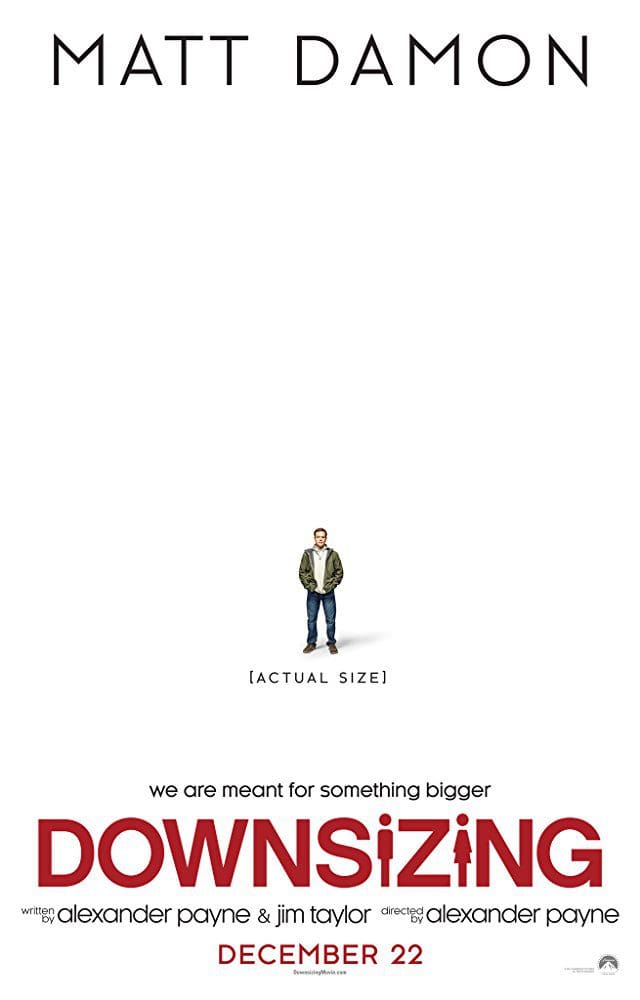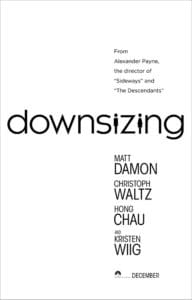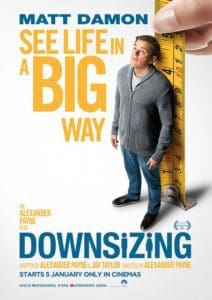
Downsizing Plot Summary:
After the scientific breakthrough is discovered to shrink oneself, people have begun going through the irreversible procedure known as Downsizing in order to live a more economically sound life. Strapped for cash and in debt, Paul (Matt Damon) and his wife, Audrey (Kristen Wiig), decide to downsize. After downsizing, Paul’s life turns completely upside down, but sees the world in a whole new light after being small.
I can’t stress this enough – we need more movies like Downsizing. There’s always one movie a year that makes me get on this soapbox. While Downsizing is uneven and has its share of flaws, I’m willing to be more forgiving of a film like this in the age of franchises, superheroes and retreads. It’s an original idea that tries to do a lot. With an accomplished director like Alexander Payne, an idea this ambitious is in good hands. As this is his first big scale movie, Payne stumbles, but when it hits, it hits big.
When I saw the runtime for this (135 minutes), I got a little skittish. While the set-up is slow and prodding, I was never bored. The first fifteen minutes sets up the world. Due to a fear of overpopulation, a Norwegian scientist (Rolf Lassgard) deciphers the formula for shrinking a human being. From there, you’re off and running. The first act shines because Payne has you glued to the screen at the origin of this discovery, and how it slowly evolves into a means for people to escape to a better life.
Within this grand idea, Payne grounds the story. Now we focus on your average couple of Paul and Audrey, played by Matt Damon and Kristen Wiig. There are no tricks here. It’s very simple. They want a better life. They want a new house. Due to debt, they can’t afford it. So what do they do? They decide to downsize, where their meager bank account translates to millions of dollars in Leisure Land, where they can live like kings for chicken scratch.
What happens next is easily the best part of the movie. Watching them go through the downsizing procedure was one of the most entertaining sequences I’ve seen all year. Payne is brilliant here. He really makes you feel the weight as to what these characters are agreeing to, as they sign off on all these waivers and have to be prepped with body shaving and intense dental work. Watching the small bodies come out of what looks like an over-sized oven was both funny and fascinating. It’s just a fantastic scene. After the actual downsizing is where the movie begins to falter.
Now that the grand set-up is done, and the gimmicks have subsided, we are left with only the characters. After downsizing, everything becomes topsy-turvy for Paul. Unfortunately, because of how intricate the set-up is, Payne doesn’t give us time to really get to know Paul. We are left with an okay character who just happens to be five inches tall.
As Paul adapts to life as a small man, the movie is hit or miss. Damon, as always, can carry any film, but there isn’t much to this guy. One of the more entertaining characters in the film, Dusan (Christoph Waltz), Paul’s obnoxious neighbor, describes Paul best: nothing works out for this guy. He’s like the live action version of Charlie Brown. Paul is pulled in so many directions, as is the viewer. The middle definitely hits a lull. Paul is really more of an observer in this film, as a lot of the big picture stuff formulates around him. This is where the movie gets good again though.
There’s no doubt Alexander Payne had a lot to say here. He hits on all the social and political issues that can be imagined when you incorporate this game changer into society. The problem is it comes off as rambling at times. As you watch this movie, you wonder what the end game is. It’s the last leg of the film though where Payne starts to focus on a central theme and brings the movie home.
The stand out performance is no doubt Hong Chau, playing a Vietnamese dissident who ends up escaping to Leisure Land. Her story is very tragic, but Chau plays the character with quiet strength and perfectly crafted dialogue that is both wise and funny. It’s those rare moments though when her emotion comes pouring out that gets her into Oscar land. The second half of this movie simply doesn’t work without her.
The relationship she develops with Paul takes over the whole film, and we are all better for it. She reminds Paul of what he wanted to be before his life got out of control and descended into nothingness. This is also when Paul’s character actually becomes interesting.
What cements this movie is the end, when Paul is forced to make a life-altering decision. He’s made so many bad ones, but this becomes the most important of all. What makes this movie great is there are arguments to be made on both sides as to what Paul should do. In a movie that becomes convoluted with big themes, Payne boils it down to one simple message, and to me, that’s why it succeeds.
This is a movie that could have benefited from a couple months of polishing the script. While the cast is good, it wastes people like Jason Sudeikis and Kristen Wiig who serve as plot devices with a lot of banal dialogue. Neil Patrick Harris is only in one scene, but his casting couldn’t have been more perfect.
Payne goes off on so many tangents. Damon even has a line at one point that sums up the entire movie, as if Payne recognizes this. The audience got a good laugh at that. If you’re patient with this movie, you’re going to leave satisfied. It’s almost as if someone took Honey, I Shrunk the Kids and made it into a cerebral experience, stripping away everything that would be considered studio friendly. I thank Alexander Payne for that, and admire this movie a great deal.
Rating: 7.5 out of 10 (Very Good)




Comments are closed.